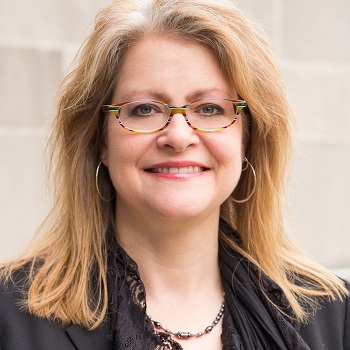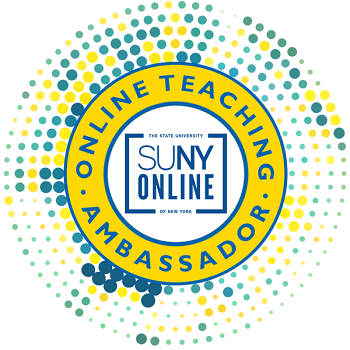SUNY Online Teaching Ambassador 2021: Suffolk – Cynthia Eaton

Cynthia Eaton is a Professor of English at Suffolk Community College. Balancing teaching, research, and college and community activism, Cynthia Eaton’s work is defined by a commitment to working with and helping others. Thus, students in her classes can expect to collaborate and interact often, to write lots and write often, and to engage in discussions about ideas and literature that truly matter in our daily lives. Since 1998, her teaching is defined daily by a commitment to social justice, and she works on a number of college and community initiatives devoted to equity among people. Professor Eaton earned her MA in English/composition at the University of Massachusetts Amherst, and her research interests focus on the intersections of composition, distance education, and unionism.
As a compositionist, I love writing, I love reading others’ writing, and I love helping students see how writing is power. When I started teaching online in 1998, it felt natural because the online environment was so writing centric. While today we have many more ways to incorporate audio and video into our courses, my online courses still give primacy to writing and reading. Call me old fashioned, but I think this is a good thing: Students perennially tell me they want to be better writers, colleagues and employers want them to be better writers, and I don’t know many people who’ll argue that the average American college student needs less reading and writing in their lives.
Thing is, teaching writing online can seem hard. Automatically graded quizzes and exams for student assessment are definitely less work for the instructor. However, it is critical that we incorporate more writing assessment into our online courses. All students can improve as writers, but the only way to do that is for them to write lots, write often, get informed feedback, and revise their writing. We cannot expect them to improve without the guidance of all instructors. I’m not just speaking to English professors. In all online courses, writing should be encouraged in as many ways as appropriate for the course learning outcomes.
Student writing doesn’t always have to mean formal research essays. Informal student writing matters a great deal. Low stakes, easy to grade writing can be incorporated using a variety of tools. In my online poetry class and in my gender and the humanities class, students create a collaborative class wiki of basic course terms. My online composition students are masters of the discussion board. Students in some classes work in small groups to compose collaborative literary analysis essays. Students in all my classes use the journal for private communications so I have a better sense of their needs as writers and as students.
Responding to student writing doesn’t have to be inordinately time consuming. On early drafts, I might provide written feedback to the entire class, inserting references to classmates’ work by way of example. In later drafts, I might provide feedback using screencast software that limits me to a five-minute video per student. Audio feedback is a snap, as most people speak 4-5 times faster than they type. Well-designed rubrics are a life saver with final drafts.
I’ve also learned that many faculty avoid writing assignments because they are annoyed by student plagiarism. They devote too much time to plagiarism detection, but it’s far smarter for both instructor and student to devote our attention to plagiarism prevention. Authentic, unique writing projects go far here, and a genuine audience of peers is built into the online experience.
Compositionists across the nation are hard at work developing materials that support pedagogies unique to online writing instruction. Learn about these, incorporate more writing assignments into your classes, and enjoy the way this brings the power of student voice into your online courses.























